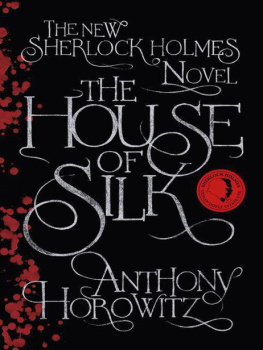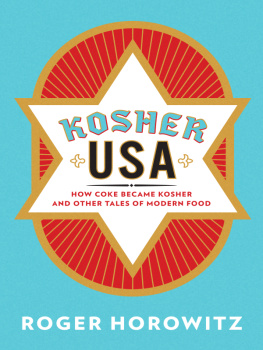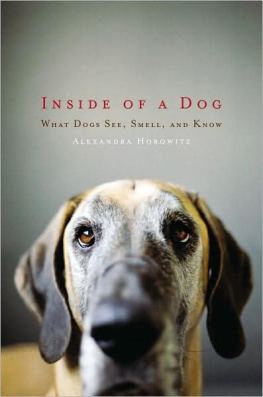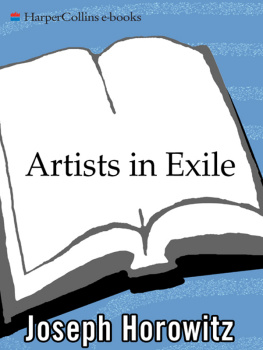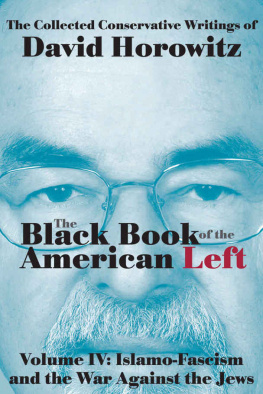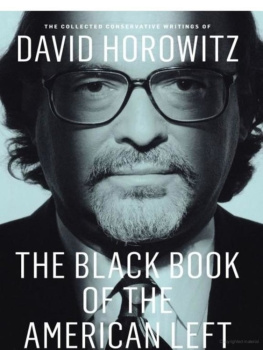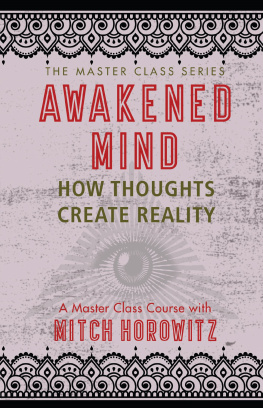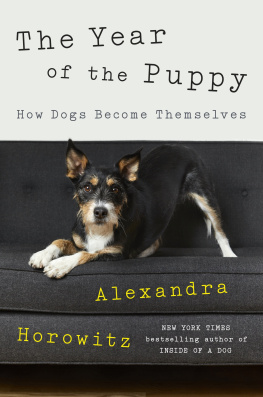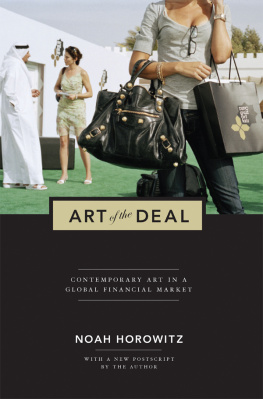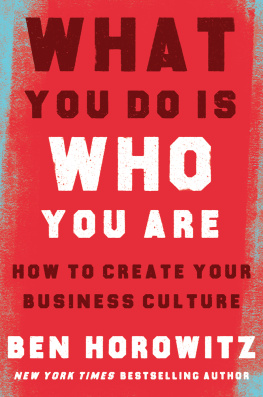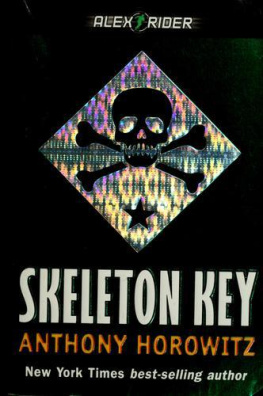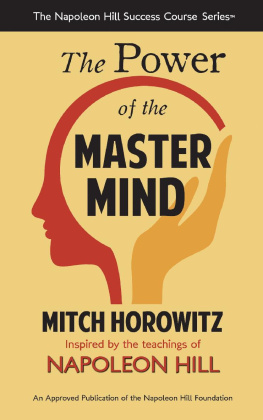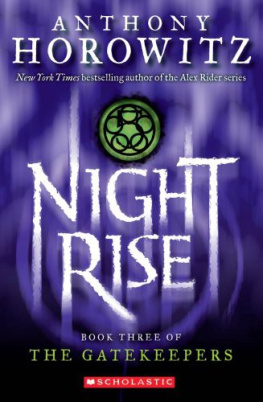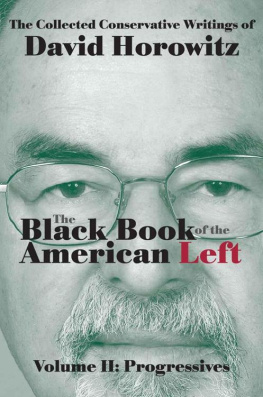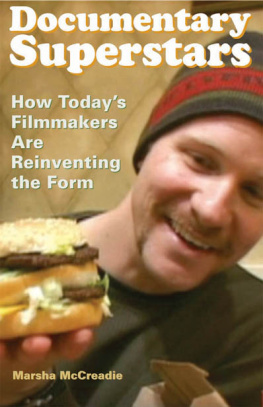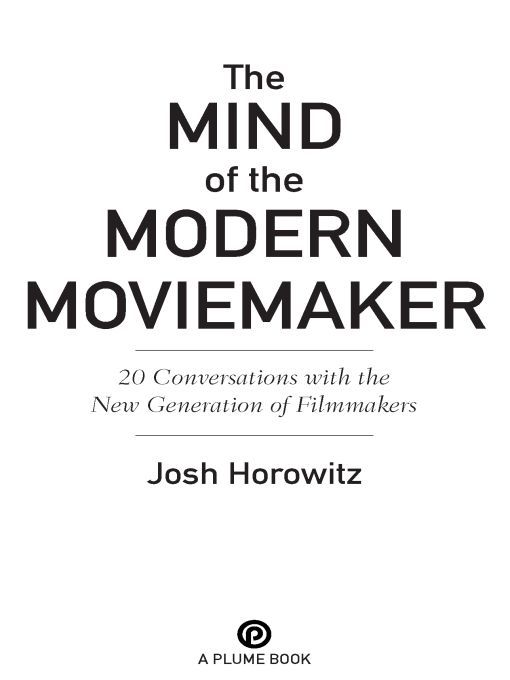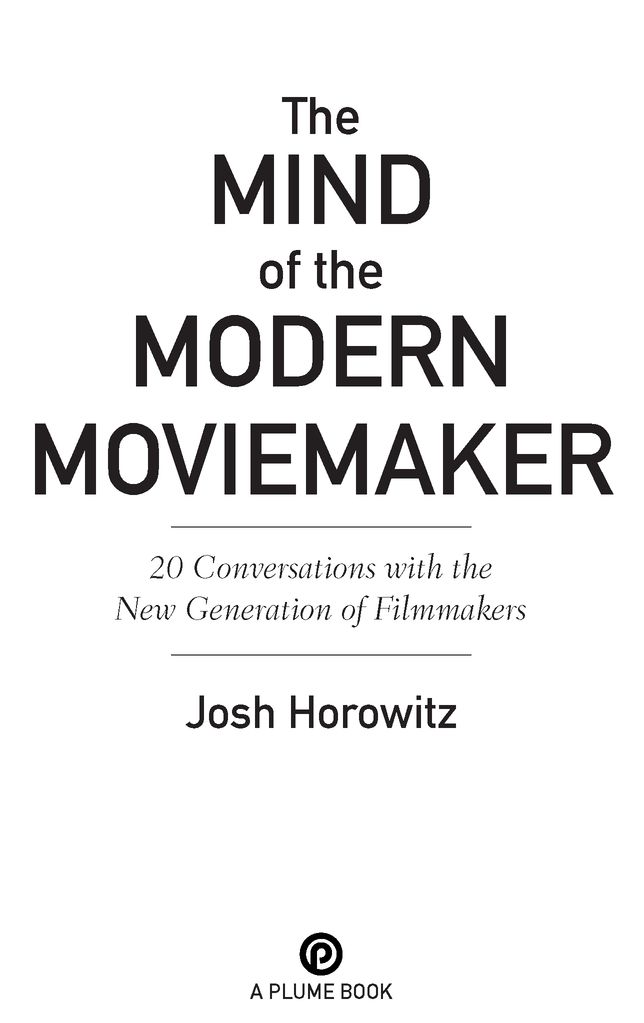Table of Contents
A PLUME BOOK
THE MIND OF THE MODERN MOVIEMAKER
JOSH HOROWITZ is a writer and television producer. His television work includes producing for Charlie Rose on PBS and talk shows on CNBC and the Fox News Channel. His writings have appeared in numerous magazines and Web sites, including Entertainment Weekly, Interview, Moviepoopshoot.com, and Us Weekly. His musings on popular culture can be read on BetterThanFudge.com. He lives in New York City.
For my parents
My motherwhose passion for the arts will
always be an inspiration
My fatherwho didnt walk out of What About Bob?
Thanks for always indulging me.
ACKNOWLEDGMENTS
There are twenty-two filmmakers whose generosity with their time and candor made this effort possible. Ive thanked all of them profusely in person, on the phone, and by e-mail. But here it is, one more time, a thanks immortalized in print.
To each of the filmmakers assorted agents, publicists, managers, and assistants, my thanks for your patience and cooperation. In particular, Id like to mention Jason Abril, Raffi Adlan, Rowena Arguelles, Chantelle Aspey, Anders Bard, Samantha Bryant, Ed Choi, Joseph Garner, Todd Gold, Tim David Harms, Marc Hofstatter, Jennifer Howell, Melissa Kates, Suzanne Lehfeldt, Bebe Lerner, Heather Lylis, Phil Raskind, Leslie Rathe, Christine Richardson, Betsy Rudnick, Andy Shapiro, Gale Stanley, and Shannon Treusch.
I was assisted in the transcribing of the interviews by Michael Fontana, Sheena Goldstein, and Priya Sanghvi.
My thanks to everyone at The Creative Culture, most especially Nicole Diamond Austin and Laura Nolan, for leading me with a sure hand. I am indebted to my editor, Jake Klisivitch, for giving this book a proper home and presentation.
When this book was only a vague idea in my head, several people lent support and advice that propelled me forward. My thanks to Chris Ryall, Keith Gordon, and to the trio of filmmakers who were the very first to agree to be a part of it: John Hamburg, Kevin Smith, and Chris Weitz.
Many friends and colleagues were generous with advice and encouragement for this project throughout. Among them were Lewis Beale, John Bobey, Alexandra Bresnan, Mark Bryant, Renee Kaplan, Jerome Kramer, the Stuart Krischevsky agency, Cathy Saypol, Liz Topp, Irene Wang, and Cara Weber.
My thanks to Courtney Litz for reading virtually every word of the book in your hands. Her recommendations and support were invaluable.
All the thanks I can possibly muster to my family. To my parents and my brother and sister, I hope it wont surprise you to know that I actually enjoy you all even more than the movies. And I enjoy the movies a whole lot.
I tend to obsess and agonize over most aspects of my life. This project was no different. Sadly for the patient, lovely, and wise Jenny Powers, she had to hear most of the whining. In the many highs and lows of this book, she never failed to be there for me. This book is better for her existence. And so am I.
INTRODUCTION
I have always found it remarkable that the experience of watching a film in a theater, unlike so many other experiences in life, has never really changed for me. Though Ill never again be ten, the rush of different emotions going to a movie elicits remains astoundingly constant. When the lights dim, I am back where I have been a thousand times before. I could be about to watch one of the most dismal wastes of celluloid in history, but for those first few moments, Im watching Citizen Kane. It has me in its grasp, and whether it lets go of me is, in the end, up to the director. I walk into that theater with the expectation of greatness, that there may be at least one moment of brilliance. Its what director Luke Greenfield calls the chill. Its those moments where, as he told me, your hair stands up on your arms, and you feel like you can fucking fly.
I wanted to do this book because I love how films can both excite and disappoint me, how they somehow can make me feel a little bit more alive, even if Ive spent the last two hours sitting by myself in a dark room. There are clearly distinct and powerful voices emerging in film today, and it is time for attention to be paid. Was it such a different feeling for an audience member walking out of 2004s Eternal Sunshine of the Spotless Mind as it was for the patron leaving 1954s On the Waterfront? Eternal Sunshine tapped into something as honest and real and true as Marlon Brando did when he picked up Eva Marie Saints glove a half century before. While Eternal Sunshine was clearly an astonishing creation of originality, other films discussed in this book more clearly echo the past. They are, in their own way, no less original. Each generation puts its unique stamp on genres, whether its Joe Carnahans call back to The French Connection in Narc or Todd Phillipss counterculture comedy Old School, a film which owes an obvious debt to Animal House. The fact that they stand up so well to (and often surpass) their inspirations is a testament to the craft of these modern moviemakers.
Countless books have been written about the seminal filmmakers of the 1970s, a period worthy of examination even if, as Paul Weitz said to me, we often conveniently remove from our memories the sub-par work that came out of that era alongside the classics. But the book I always wanted to read about my heroes of the 1970s was the one written then. As fascinating as it is today to hear someone like Spielberg or Scorsese or Coppola or DePalma reflect on the past, what were they thinking at the time and in the moment? They are fully formed filmmakers now, resolute in their methods and ideologies but surely it must have been fascinating to hear from them as they were learning, while they were experiencing the early ebb and flow of a career. That is what this book is all about.
There is astounding work being done today and great filmmakers are emerging every year. I wanted to capture the young talents of today before we know how it all pans out, before their Oscar acceptance speeches or their $100 million flop. The filmmakers in this book are still developing. For many, their best work is yet to come, and that is what is perhaps most exciting about them.
Hindsight is 20/20. We ask how and when and why brilliant directors of the past lost their way. How could the talents behind such films as The Godfather, The Last Picture Show, and The Exorcist be the same artists responsible for Jack, The Cats Meow, and Jade? Several of the filmmakers I spoke with worry about similar fates. Most agreed it was simply a matter of keeping in touch with the world around them. David Gordon Green said, I think theres a point in your life as an artist when youre aggressively reacting to the world around youand who you know or what you know and who you hearand theres a point when youre not listening anymore and youre just Woody Allen. This sentiment was echoed by filmmakers as different from Green as McG and Brett Ratner. Can todays filmmakers avoid the mistakes of the previous generation and remain in the moment?
Whether a filmmaker can maintain any degree of individuality in todays system was another topic very much on the minds of many filmmakers. Debates raged over the importance of final cutthat ability to have the final say over the cut of your filmand test screenings. Directors like Todd Phillips told me that Testing a movie in general is crucial. I always find it amazing when directorsoutside of Steven Spielbergjust say, Heres the movie; take it or leave it. I just find it astounding, because ultimately you really dont know what you have until you put it up there. As for final cut, Brett Ratner asked rhetorically, Why do I need final cut? Final cut is for artistes quote unquote, directors whose movies dont make a lot of money. On the other side of the fence was a filmmaker like Karyn Kusama, who in the midst of editing her first big studio film told me shed likely never do another film of that kind without final cut. Ive realized Im a strong-minded director with a very clear sense of what I want to do, and I just want to be left alone to do it, she said.


